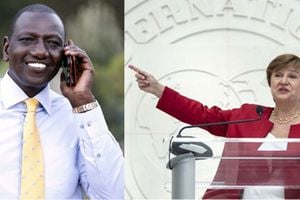Babara Omwayi: The CEO who has decoded GenZ professionals

Babara Omwayi, the CEO of Spark Communications and founder of Spark Empower Mentorship Programme that seeks to transform the lives of the youth, when she spoke to Nation.Africa at Nation Centre on December 4, 2023.
What you need to know:
- After 13 years of experience in the marketing field, Babara Omwayi started a marketing firm, Spark Communications.
- By 2016, she had created a mentorship programme for young people.
- Unlike many other bosses who struggle navigating a Gen Z workforce joining the job market, Babara believes she has figured out a cheat code.
The first thing Babara Omwayi does when she gets to her office at 7.30am is to tune in to one of her favourite podcasts. If it is not Oprah Winfrey, it is probably Dr Patriciah Murugami or Vusi Thembekwayo. Afterward, she checks her email and scans through various local and international news channels to keep up with current affairs.
At 8am when her team, which comprises mostly of Gen Zs starts to stream in, she is ready to execute her Chief Executive Officer role and oversee the running of the day.
Despite being orphaned at age 10, Babara was determined to succeed. That meant becoming very intentional with the people she surrounded herself with. She made sure to seek out a mentor, who introduced her to spaces that mattered, and in the end, it paid off.
By the time she was 26, she was a general manager of a global marketing brand handling business across markets in East Africa. At 30, she was sitting in various boardrooms with decision-makers.
“In my 20s, I surrounded myself with women who were ahead of me who held my hand. Some of my mentors today are people I met years ago, but we still talk whenever I need pieces of advice.”
After 13 years of experience in the marketing field, she started her marketing firm, Spark Communications and while recruiting, she realised just how big the gap was in the transition between exiting university and entering the job market. It was not just the unrealistic pay expectations, but many graduates could hardly dress or communicate for the corporate world. This left many youths struggling in a very competitive and limited job market.
She informally began to mentor those who were closest to her starting with two young men. The more she did it, the more the need revealed itself. By 2016, she resolved to create a structured programme to effectively handle the rising numbers.
At the tail end of last month, after seven years of her Spark Empower Programme, Babara received a Humanitarian and Social Impact Award by the Organisation of Women in International Trade (Kenya) for her role in transforming a generation.
Her free Mentorship Programme, which targets 22 to 25-years-olds is a testament her commitment. Until last year, her focus was on girls, but she has since altered it to include young men because she realised the boy child was being left behind.
To get mentees, she sends out application calls through her company's social media platforms and its website for interested parties.
Young people
At any given time, she receives more than 1,000 applications but because of their limited capacity, they only take 20 individuals after rigorous sifting for a period of nine months. She prioritises campus students who are outside Nairobi because these areas received minimal exposure to opportunities compared to the capital city.
Her empowerment programme focuses on career development, effective networking, sustainable development, wellness and mental health, financial literacy, sales and pitching skills, and entrepreneurship among others where she engages field-specific expert mentors.
So far, she has impacted more than 1,030 young people through the Empower programme, and also via university outreaches.
Unlike many other bosses who struggle navigating a Gen Z workforce that is entering the job market, Babara believes she has figured out a cheat code.
The visionary CEO whose company was founded in 2014, embodies an intriguing blend of dynamic leadership and boundless creativity in her approach to connecting with them.
“She is very chill to work with,” her programme manager Leon Ndunda says with a big broad smile. It’s easy to praise your boss in the presence of a stranger, and realising my scepticism, Babara showed me an email she had received while we were having our chat.
“Hi Barbz, I have sent a sample of the design,” it read. The email was from another of her Gen Z employees.

Babara received a Humanitarian and Social Impact Award by the Organisation of Women in International Trade (Kenya) for her role in transforming a generation.
She does not micromanage but instead gives her employees the freedom of expression.
“Gen Zs do not like rules. I focus more on the output and I am consistently surprised by the results. I allow them to play music in the office and we do Tiktok challenges together. I am also constantly seeking out their ideas and opinions; my place is just to guide them. I have also learnt to empathise and listen to them which has made it very pleasurable working with them.”
When Babara is not running her business and the empowerment programme, she enjoys spending time with her family, cooking and reading. In her house is a library with a variety of books, but she will not lend you even if you plead. She did it in the past, but the books never came back.
A trained journalist, Babara could not get a job in media and was forced to take up sales instead. A firm believer in always saying yes, she believes her positive attitude has enabled her get to where she is today.
Mentoring service
"Do not wait until you figure it out, just say yes because you will always have a community to help you figure it out along the way."
In the next three to five years, she hopes to have a resource centre for youths. She also aims to digitise her mentoring services to have a wider reach of people with her target being 10,000 young people.
Barbara calls on all other employers to integrate mentorship programmes as a mandatory requirement for young people joining the workforce. This would ensure the individuals are well-rounded and responsible citizens. To do so, she suggests enhanced partnerships and collaborations with existing youth programmes.
She insists that anyone and everyone can take up mentorship through the various forms, be it active, passive or via technology assisted channels.
“We should not also forget about reverse mentorship, because young people who drive this economy have a lot to offer and no single individual knows everything,” she concludes.




